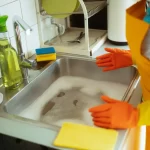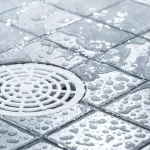As part of our ongoing effort to inform and assist homeowners in Greater Toronto, including Etobicoke and Mississauga, we are revisiting some significant plumbing topics that continue to be relevant. Our blog has covered a variety of plumbing issues over the years, ranging from major concerns to more subtle problems. In this new series, we’ll dive deeper into some previously discussed topics, highlighting the importance of addressing these issues proactively.
1. Remove Your Running Trap Before Disaster Strikes
Understanding Running Traps:
Historically, running traps—also known as sewer traps—were introduced to prevent sewer gases and rodents from entering homes. These devices are essentially U-shaped pipes designed to create a water barrier that blocks unpleasant and potentially harmful sewer gases from coming up through the drains. They were a significant advancement in their time, offering a solution to a common problem.
Limitations of Running Traps:
Despite their initial effectiveness, running traps have notable drawbacks. Their design makes them challenging to clean, leading to inevitable clogs over time. When these traps become clogged, they can cause serious problems, including blocked drains and potential sewer backups. Unlike modern solutions, such as backwater valves, running traps don’t offer a straightforward method for maintenance or cleaning.
Modern Solutions:
The introduction of backwater valves has largely replaced running traps due to their superior functionality. Backwater valves are mechanical devices that prevent sewage from flowing back into your home by using a flap or gate that closes when water tries to reverse direction. This solution addresses many of the issues associated with running traps and provides a more reliable and easier-to-maintain alternative.
If you still have a running trap in your plumbing system, it’s crucial to consider upgrading to a backwater valve. A licensed plumber can help with the removal of the old running trap and installation of a new backwater valve, ensuring that your home is protected from future plumbing disasters.
2. Sewer Smell Coming From Your Bathroom or Basement
Identifying the Source of Sewer Odors:
A persistent sewer smell in your bathroom or basement can be both unpleasant and alarming. This odor often signifies a more serious issue within your plumbing system. Common causes of sewer smells include:
- Sewage Backup: This occurs when waste water from the sewer system reverses flow and enters your home. It can be caused by blockages, overflows, or issues within the municipal sewer system.
- Blocked Vents: Plumbing systems have vent pipes that allow sewer gases to escape outside. If these vents become blocked, gases can enter your home instead.
- Deteriorated Drain Pipes: Over time, drain pipes can corrode or develop leaks, leading to sewer odors escaping into your home.
- Overloaded City Sewers: During heavy rainfall or other events, city sewer systems can become overwhelmed, causing backflows into residential systems.
Steps to Address the Issue:
To resolve sewer odor problems, it’s essential to identify the root cause. This process often involves:
- Inspection: A professional plumber will conduct a thorough inspection of your plumbing system, including drains, vents, and sewer lines, to determine where the problem lies.
- Diagnosis: Based on the inspection, the plumber will diagnose the specific issue, whether it’s a blockage, a leak, or a problem with the sewer system itself.
- Resolution: Once the cause is identified, the plumber will recommend and implement the appropriate solution, which may involve cleaning blocked vents, repairing or replacing pipes, or addressing sewer backups.
Prompt attention to sewer smells is vital to prevent potential health hazards and extensive property damage. If you notice any unpleasant odors in your home, contact a licensed plumber to investigate and resolve the issue.
3. How Much Does It Cost To Hire Toronto Plumbers?
Understanding Plumbing Costs:
One of the most common questions homeowners have is about the cost of hiring professional plumbers. The cost of plumbing services can vary widely based on several factors, including:
- Scope of Work: The complexity and extent of the plumbing issue play a significant role in determining costs. Simple repairs will generally be less expensive than major installations or complex repairs.
- Hourly Rates: Plumbers often charge by the hour, with rates varying based on experience, expertise, and the time of day. Emergency services or work outside regular hours can incur higher charges.
- Materials and Parts: The cost of materials, parts, and any necessary replacements will also impact the total cost of the job.
- Geographic Location: Plumbing rates can vary based on location, with urban areas typically having higher rates due to increased demand and cost of living.
Why Professional Plumbing Services are Worth the Cost:
Investing in a professional plumber is often worthwhile for several reasons:
- Expertise: Professional plumbers have the training and experience to handle a wide range of plumbing issues, ensuring that problems are resolved correctly and efficiently.
- Quality Work: Hiring a licensed plumber reduces the risk of mistakes and subpar work, which can lead to additional repairs and higher costs in the long run.
- Preventive Measures: Professionals can identify and address potential issues before they become major problems, saving homeowners money and preventing damage.
While DIY plumbing fixes might seem cost-effective, they often lead to complications that can be more expensive to repair. For critical plumbing issues, hiring a licensed plumber is a prudent investment in the long-term health of your home’s plumbing system.
4. Toronto Condo Plumbing: Who Is Responsible For What?
Plumbing Responsibilities in Condos:
As condo living continues to grow in Toronto, understanding plumbing responsibilities within these units becomes increasingly important. Generally, the division of responsibilities is as follows:
- Building Management: The condo building is responsible for the plumbing infrastructure that services multiple units. This includes main lines, pipes, and systems that deliver water to each unit and manage drainage for the entire building.
- Individual Unit Owners: Condo owners are typically responsible for the plumbing within their own units. This includes maintaining and repairing pipes, fixtures, and appliances that are specific to their individual unit.
Navigating Condo Plumbing Issues:
To effectively address plumbing issues in a condo, it’s essential to:
- Review Condo Regulations: Each condo building will have its own set of rules and regulations regarding plumbing responsibilities. Familiarize yourself with these guidelines to understand what you are responsible for and what falls under the building’s jurisdiction.
- Coordinate with Building Management: For issues related to the building’s plumbing infrastructure, such as leaks or blockages affecting multiple units, coordinate with the condo’s management team. They will handle repairs and maintenance for common areas and shared systems.
- Hire Professional Help: For plumbing issues within your unit, consult with a licensed plumber who can address and resolve problems effectively. Ensure that any work done complies with the condo’s regulations and standards.
Understanding these responsibilities can help prevent disputes and ensure that plumbing issues are addressed promptly and appropriately.






